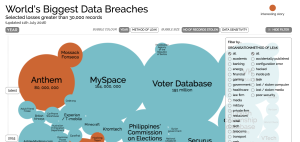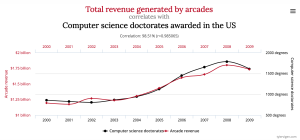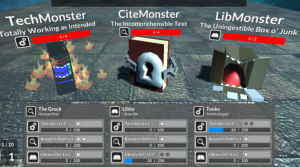Information is Beautiful has a great interactive on World’s Biggest Data Breaches & Hacks. The interactive shows how data breaches are getting worse, but it also lets you look at different types of breaches.
Making Algorithms Accountable
ProPublica has a great op-ed about Making Algorithms Accountable. The story starts from a decision from the Wisconsin Supreme Court on computer-generated risk (of recidivism) scores. The scores used in Wisconsin come from Northpointe who provide the scores as a service based on a proprietary alogorithm that seems biased against blacks and not that accurate. The story highlights the lack of any legislation regarding algorithms that can affect our lives.
Update: ProPublica has responded to a Northpointe critique of their findings.
Professor Emeritus Seymour Papert, pioneer of constructionist learning, dies at 88
From Humanist and then MIT News, Professor Emeritus Seymour Papert, pioneer of constructionist learning, dies at 88. Papert was Piaget’s student and thought about how computers could provide children a way to construct knowledge. Among other things he developed the Logo language that I learned at one point. He also collaborated with the LEGO folk on Mindstorms, named after his book by that title.
Digital Humanities 2016 in Kraków
The week of the 11th tot he 16th of July was Digital Humanities 2016 in Kraków. This conference was, in my opinion, the best organized DH conference I have attended (and I have attended most of them since the first joint ACH-ALLC conference in Toronto in 1989.) Jan Rybicki and Maciej Eder deserve credit for a lovely conference.
My conference notes are on philosophi.ca so I won’t go into a lot of detail here. Some of the themes worth noting include:
- Diversity. There was a lot of discussion and sessions dedicated to diversity of different sorts. Real differences were aired that I think most people felt was good.
- Pedagogy. Perhaps it is what I attended, but it seemed that there was a new energy around pedagogical discussions. I was impressed by the creative approaches and also by the large-scale projects like Dariah-EU working group on Training and Education.
- Web Historiography. There were a number of talks/panels that drew on the web as evidence. I was pleased to see a discussion of the need to think historiographically about the web. What is archived? What is missing?
- Posters. There was a great set of posters. Here is a link to photos I took of a selection.
Some of the events and papers I was involved in include:
- New Scholars Symposium which was supported by CHCI and centerNet. I co-organized this with Rachel Hendry.
- Innovations in Digital Humanities Pedagogy: Local, National, and International Training. I was part of a one day mini-conference on training and gave a short presentation on Visualization at the final panel on Publication Approaches Supporting DH Pedagogy.
- CWRC & Voyant Tools: Text Repository Meets Text Analysis. I was one of three instructors on a workshop on CWRC and Voyant.
- Curating Just-In-Time Datasets from the Web. I gave a paper on a project that is scraping Twitter that was coauthored with Todd Suomela and Ryan Chartier.
- The Trace of Theory: Extracting Subsets from Large Collections. I introduced and gave one of the short papers on a panel of work we did as part of the Text Mining the Novel project with the HathiTrust Research Center.
- Web Historiography – A New Challenge for Digital Humanities? I gave a short presentation on the Ethics of Scraping Twitter.
Spurious Correlations
Spurious Correlations is a great web site that shows correlations that are spurious like this one between revenue generated by arcades and computer science doctorates. The gathered correlations show how correlation is not causation.
Thanks to Dan for this.
dhQuest: The Game
From Twitter I learned about dhQuest – a game of digital humanities. In the game I played (with just one player) I had three characters (a researcher, a librarian, and a technologist) that I deployed to complete quests as I built a digital humanities centre. Very nicely done.
They know (on surveillance)
They know is a must see design project by Christian Gross from the Interface Design Programme at University of Applied Sciences in Potsdam (FHP), Germany. The idea behind the project, described in the They Know showcase for FHP, is,
I could see in my daily work how difficult it was to inform people about their privacy issues. Nobody seemed to care. My hypothesis was that the whole subject was too complex. There were no examples, no images that could help the audience to understand the process behind the mass surveillance.
The answer is to mock up a design fiction of an NSA surveillance dashboard based on what we know and then a video describing a fictional use of it to track an architecture student from Berlin. It seems to me the video and mock designs nicely bring together a number of things we can infer about the tools they have.
Hokusai x Manga
Cover of Playboy Roasted à la Edo
The Hamburg Museum of Arts and Crafts has a well designed exhibit called Hokusai x Manga that looks at the history of comics from the first kibyōshi to current manga and videogames. The exhibit draws on an extensive collection of woodblock books and prints from the Edo period. They mix a historical approach with themes like the depiction of demons (Yokai) in print and the franchise Yo-kai Watch.
One of the earliest comic picture books that they have is Kyōden’s Playboy, Roasted à la Edo (1785). Harvard has put up a Flash version of this in English and Japanese. (Second book here, third here.) They also have a copies of Hokusai Manga (or Hokusai’s Sketches) published starting in 1814 which was a sort of manual on how to draw with lots of examples. Note that “manga” at the time didn’t mean what it means now.
There is an excellent catalogue with useful essays including one at the end on “Manga in Transition” by Jaqueline Berndt.
Shulze, S., et al. (2016). Hokusai X Manga: Japanese Pop Culture since 1680. Munich, Hirmer.
Barbie Careers Game Developer Doll: No Batteries Neede
From Slashtdot, Mattel has released a Barbie® Careers Game Developer Doll. She has “[b]right red hair and eyeglasses are fashion-forward with techie style!” This time Mattel has been careful not to be patronizing.
A laptop (with real game code graphics), tablet (with the game she is working on) and silvery headset expand the storytelling possibilities and career opportunities.
Inspire young gamers with this doll who is at the top of her game!
Dungeons & Dragons: Satanic Panic – Video – NYTimes.com
The New York Times has a video series called the Retro Report. One story is about Dungeons & Dragons: Satanic Panic. It looks at the media fed moral panic that eventually lost steam. It ends by praising all the “leadership” and “moral” skills learned. Now experts are recommending “free play” and … ironically … role playing games are now the solution!






